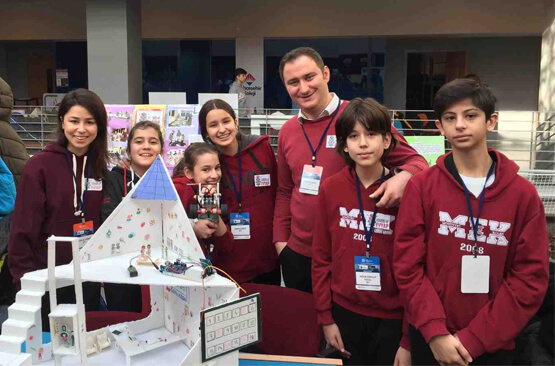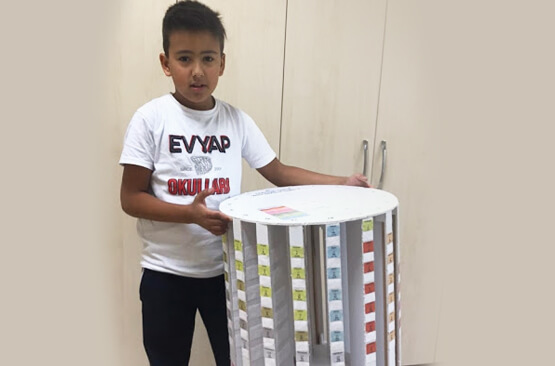SCIENCE
SCIENCE
SCIENCE AND TECHNOLOGY
“If one day my words conflict with science choose science.” M. Kemal ATATÜRK
In today’s world, the rapidly developing science and technology causes our life to become increasingly dependent on the use of technology. There are new discoveries as each day passes and along with it an increase of information. Increase in information increases the variety of information, thus rapidly ageing its content. This rapid change is progressing each passing day, making a headway. With this change in mind, questions arise such as how to teach so much information, of which would be useful to teach and why such a temporary content should be taught. When considered at this point, it became a matter of teaching the learner how to learn rather than teaching the learner the information. Therefore, the learner is able to reach the information they want and learn the information they need. A constructivist educational strategy has been built on this infrastructure and our lessons have been created with this approach.
In order to develop learners who are able to adapt to the conditions of the globalizing world, the values aimed are enabling our learners to develop knowledge, experience and interest in the professions they desire, enabling them to become independent learners and as a result to keep up with the changing nature of the business field, to act willing to know and understand, inquire, value natural environments, value logic, think about consequences of actions, possess scientific and ethical values, increase their economic efficiency through using knowledge, understanding and skills in their professional lives.
LIFE SCIENCES
Our main goal as Evyap schools are to develop scientist’s that are literate in science, are curious, possess the capability of thinking, researching, inquiring and resolving issues encountered in daily life and presenting projects that they themselves develop. For this purpose, whilst taking into account all individual differences of our learners, we organize activities to teach them how to reach information, develop their thinking, research and inquiry skills to enable them to ask creative questions and prepare environments where they can use all these scientific skills.
The most important function of science, physics, chemistry and biology classes; awareness in individuals of science and engineering practices and the gaining of science literacy in future generations. At our school, experiments and observations of subjects taught in the classroom are carried out in our laboratories to enable learners to learn through practice and experience. Thus, our learners reinforce these studies and develop their ability to establish cause-effect relationship skills and an increase in their analytical thinking performances. National and international trips based on learning outcomes are organized in order to improve the creativity skills of our learners who are enthusiastic about science and creativity.
MATHEMATICS
As Evyap Schools, we aim to develop indiviuals who think authentically, are self confident, who research, inquire and possess analytical thinking, and are able to resolve issues encountered in daily life. Numbers and quantities; we carry out many in-class activities with our learners so that they can better comprehend structure and proporties and the relationship between them. Importance is attached to different and original projects in various mathematical fields in order for our learners to acquire the power to make inferences and interpretation towards the internalization of concepts and vital counterparts during the process of understanding mathematics, we also participate in various tournaments. The use of mathematical and logical games that create a bridge between thinking and abstract concepts are highly regarded at our school. Thus, our learners indirectly witness that mathematics is a popular lesson, easy to understand, and can be applied in daily life. The progress of our learners are evaluated and assessed constantly at our school through the national and international exams and olympics they attend each year. Our learners interest in math class is increased with the World Mathematics Day celebrations and various club and trip activities.
It is of great importance that teachers are in a guiding position for learners that the mathematics class is not a difficult or exhausting and for them to direct learners in this sense. Teacher, learner and parent cooperations are valued for academic success.
INFORMATION TECHNOLOGIES
At the Private Muruvvet Evyap Schools Information Technologies department, within the scope of the Information Technologies and Software classroom, we develop our learners as productive digital citizens that have skills of the 21st century, are technology literate, and have a solution-orientated approach to problems. In our classes, we enable our learners to learn how to use technology in the most appropriate way and develop themselves with new learning experiences, and integrate innovations in technology and eduction to our lessons by following up–to-date technological developments. Within the scope of the contents of the class, our learners are preparing not only for the present but also for the future. One of the significant aims of the Private Muruvvet Evyap Schools Information Technologies Department is to take our leaners out of the consuming generation and enable them to become a producing generation through robotic and coding training.
Implementation of our classes
Education programs in our classes are implemented to enable learners to develop into individuals who have the skills to use information technologies in their daily lives. Course contents are prepared towards increasing computational and algorithmic thinking skills. At our school, the Information Technologies and Software class is taught theoretically and practically at all grade levels from kindergarten to high school in computer labs or maker workshops, using the necessary robotics and coding materials and open source electronic kits.
Teaching Practices
The following training is carried out in our Information Technologies and Software classes.
Kindergarten and Primary School
Office Programs
Technology Literacy and Digital Citizenship
Technology and Health
Problem Solving Skills
Algorithm Logic
Electronic Circuit Kits
Use Case Applications
Semi Coding Applications
Block Coding Applications
Lego
Game Design
STEM
Secondary School
The basics of Computer Science
Ethics and Safety
Technology Literacy and Digital Citizenship
Microsoft Office Programs
Development of Problem Solving Skills
Block Based Coding
Arduino
3D Design Applications
Software
Development of Mobile Application
Lego
Game Design
STEM
High School
Technology Literacy and Digital Citizenship
Microsoft Office Programs
Arduino
Software
Mobile Software
3D Design
Game Design
STEM
Web Design
In our Information Technologies and Software classes, teamwork, collaboration and peer learning environments are provided to guide and encourage our learners. Positive behaviors are reinforced by displaying the products developed by our learners.
CODING
The word coding, which is also known as programming, infers to a set of operations predicted to be carried out according to certain conditions and order. Programming is an application and development process performed with various instruction sets to realize a certain task by computers, provide human-computer interaction and solve problems (Business Dictionary, 2015). It can also be defined as giving commands within a certain order and system to make the computer to do work.
Coding offers children the opportunity to develop many skills that will be useful in all areas of life and necessary to execute professions of today and tomorrow, such as problem solving, communication, teamwork, planning, decision making, evaluation, creativity, critical thinking, and observing the relationship between events.
With the coding training at our school, we are developing generations at our school that develop alternative thinking skills, can look at situations and problems from different angles, solve problmes with analytical methods, establish interdisciplinary interaction, and using technology to produce technology and not consume.
THINK-DESIGN-MAKE (MAKER)
As Private Muruvvet Evyap Schools, with our workshops, we provide envrionments for our learners to become generations that produce and not consume. Our schools Think Design Make workshops are environments where learners can bring the maker spirit alive. The maker spirit is based on imagination, sharing rather than competing, and experience rather than skills and memorising. Our learners can make existing products more useful and reproduce if necessary. In addition to technology skills, our learners are offered the opportunity to develop 21st century skills that will be useful in all areas of life such as, problem solving, communication, teamwork, planning, decision making, evaluation and creativity with coding and programming. The work carried out in the workshops are based on interdisciplinary studies.
Our perspective as a school in the aim for supporting our learners in taking their own learning responsibilities while using all these environments and doing their studies is “think, make, make mistake, learn, repeat, produce”. In this direction, our learners can think, design and produce freely.
LEARNING EXPERIENCES

















